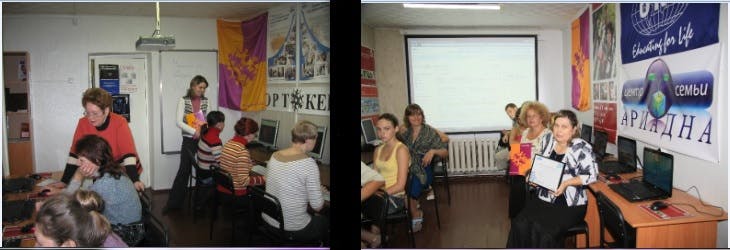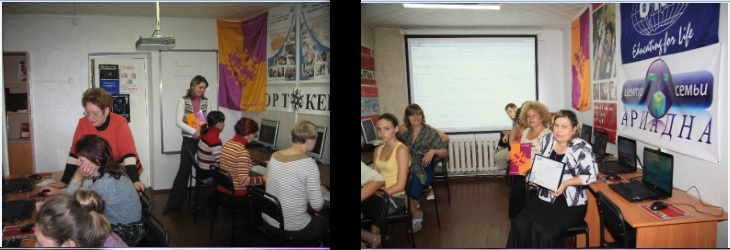Letter from Nadezhda Sokolova in Rybinsk, Russia
Apr 28, 2022
First story


My interest in what we first knew as, “information at one’s fingertips,” and now call, “information technology,” was not at all a matter of chance. At the end of the 1990s when perestroika was in full swing in Russia, everything was in a state of flux. Companies had an urgent need to restructure. People were looking for new jobs - not only because the old jobs were gone, but because they could now move toward new opportunities. This shifting landscape affected everything: cities, businesses, families, and individuals.
Later, someone said that it had been especially difficult for those who were born in 1960s. I was among those. It is true that many of my generation failed to adapt at the speed the new times required. Motivation was everything.
I was an engineer working at a business that responded pretty flexibly to the changing environment. The first computers were appearing in some departments, but only a very few lucky men got the chance to work on them.
It was prestigious to work on a computer, but there were real hurdles. You had to master computer skills on your own; there was little information available; there were almost no computer training courses, and those that existed were very expensive. You had to seek out those who already had some computer skills, often following at their heels, asking them to show you how to do this task or that on the computer.
There were a constantly increasing number of documents to produce, and I had to work on a typewriter. I decided to go to my boss and ask for a computer, even if it were an outdated one. I had to work hard to convince him, but in the end management met my request and so I got my first workplace computer.
I learned to work with office programs, create charts, and design documentation templates. As a result, I was soon promoted. This is how informational technology entered my life, and it is still enhancing my personal growth. I continue to research the opportunities technology provides to make my work and the work of my colleagues more effective.
Outside of work, I have gone on to design network tasks within my focus of activism. In about 2001 a women’s group was organized in our local Jewish community by Project Kesher, a Jewish women’s organization that was working in communities throughout Belarus, Georgia, Moldova, Russia and Ukraine. I was sent to participate in a training program that Project Kesher was offering to offset income instability among women. After the training, Project Kesher offered me a job as coordinator of an ORT-Keshernet project specially designed to help women gain computer skills. In 2002 there were already ten ORT-Keshernet computer training centers operating in different cities of Russia, Ukraine, Belarus and Georgia. Today, there are sixteen.
The history of the development of the ORT-Keshernet project parallels the story of how IT came into my life. In those difficult post-perestroika times, when donors asked women in the former Soviet Republics how they could help them, women responded that they wanted to learn to use computers because that would give them a way to provide for their children and themselves. That was so close to what I had felt!
Today, more and more local women have become aware of the gender-based “information gap” that hampers women in our society. ORT-Keshernet training helps them to bridge this gap. At our computer centers, in addition to basic training in computer skills, we provide our students with specialized trainings like workplace and communication skills, résumé writing, and economic and legal literacy. Through personal and online coaching, they learn to write business plans and use to their advantage bank products and services like credit, investments and securities.
Our students’ success stories are so gratifying to us, and there are so many of them. Since 2002 we have trained more than 30,000 women in ORT-Keshernet centers and more than 75% of them have improved their economic status as a result. Women share with us how, thanks to their new business and computer skills, they have managed to hold onto their jobs, earn more, or find better jobs. Some of our students even start their own businesses.
IT not only expanded my personal boundaries, but also helped me build a network to develop cooperation among women activists who are sometimes working at great distances from each other. I consider my encounter with Project Kesher to be a great stroke of luck! Project Kesher is guided by such immense goals as changes in the attitude of society towards women, and through it, I have learned that women can accomplish anything. That is what I tell every new student coming to us: You need only have a desire to develop yourself and help others to do the same!
- Nadezhda Sokolova, Rybinsk, Russia
In addition to her day job as a leading HR expert at her engineering plant in Rybinsk, Nadezhda serves as coordinator of ORT-Keshernet and leader of Project Kesher’s group in Rybinsk, which advocates for women’s rights and tolerance locally and throughout the region.
It is due to the ORT-Keshernet center that, since 2009, the Project Kesher women's group in Rybinsk has been named among the 50 best NGOs of the region.




